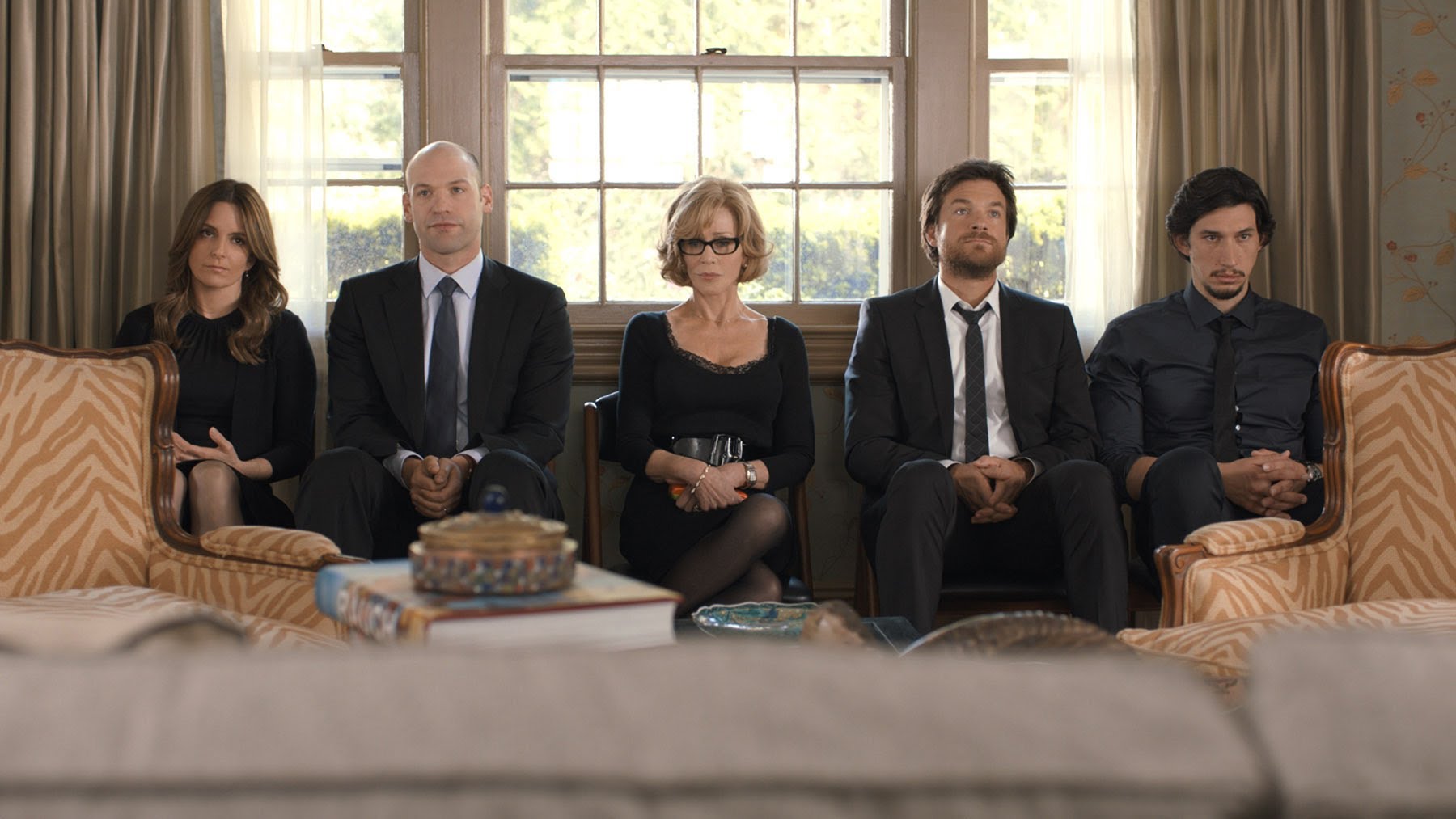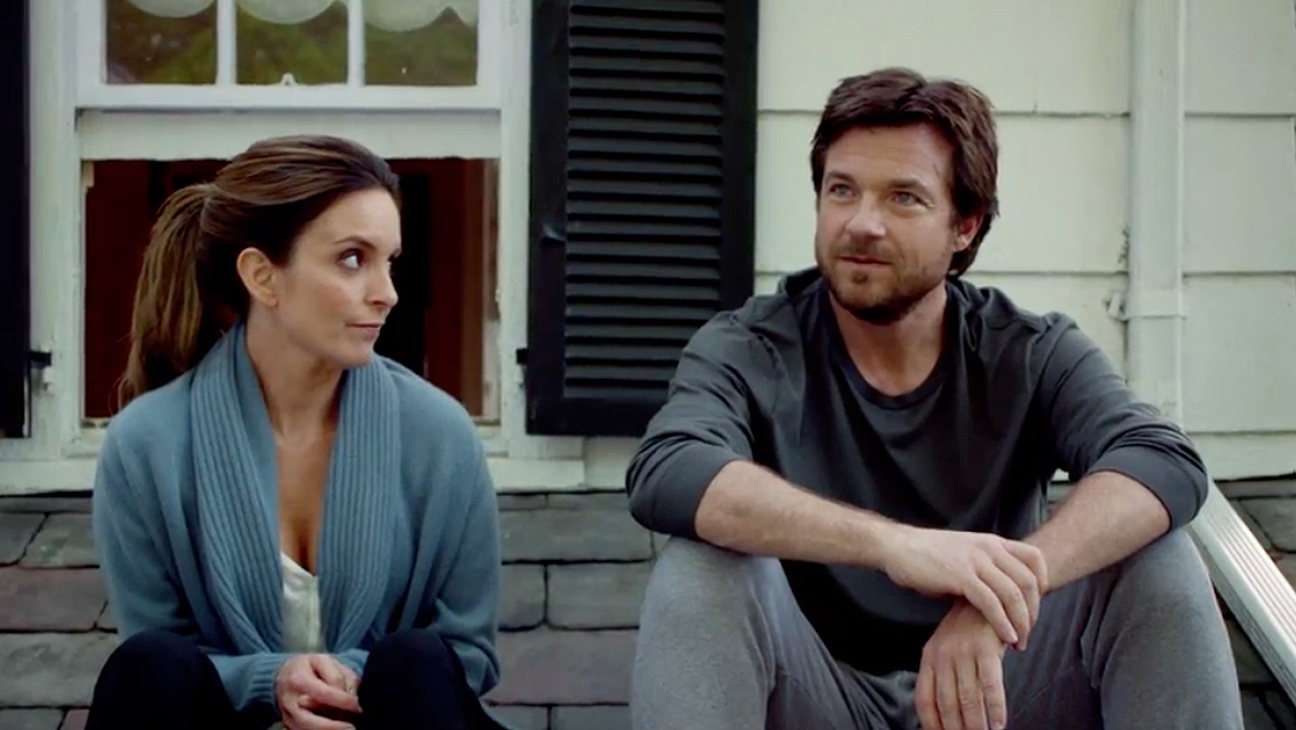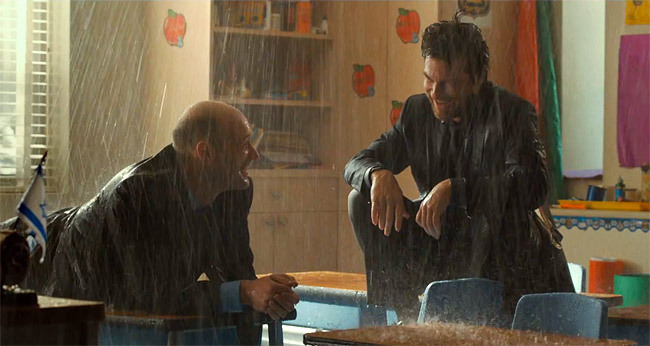A time-honored tradition of movies follows these basic contours: adult progatonist’s parent dies/relative gets married/family celebrates holiday. Adult protagonist returns to ancestral home from comfortable, grown-up life to discover that everything that he/she has assumed about him/herself is blown to pieces, and he/she must rediscover self in the company of an inevitably zany but ultimately loving family.
 Warner Bros.
Warner Bros.Usually a parent or other elder relation is unhinged. Explosions, accidents, or sexual escapades of a dubious nature ensue. Frequently the protagonist’s romantic life is on the rocks, which is convenient for the introduction of an old or new flame who can reveal to the protagonist some new dimension of life or identity. Ultimately, protagonist must learn to loosen up or accept people for who they are or take life one day at a time or something else you might read in a slogan on Pinterest.
I inexplicably adore this genre—even the mediocre-to-pretty-bad ones. I can rattle off a list off the top of my head from the last decade or so: Garden State, Margot at the Wedding, Rachel Getting Married, Elizabethtown, A Christmas Tale, August: Osage County, The Royal Tenenbaums (lots of Wes Anderson’s work, actually).
So, as an aficianado, I beg of you: if you get the impulse to see This Is Where I Leave You, save your money and watch any of the above films. Any of them, even the ones with low Rotten Tomatoes scores. They’re all better than this one.
To rehash, with particulars: a week ago, Judd Altman (Jason Bateman) had a nice life, with a comfy apartment, a good job as a radio producer, and a beautiful wife. It all falls to pieces when he comes home early with a birthday cake (of course) to find his wife in bed with his boss (Dax Shepard), who is a terrible person, as evidenced not just by his womanizing but also by his obnoxiously blonde hair. Then Judd’s mother (Jane Fonda) calls to say that his father has died. Though he was a Jewish atheist, his dying request was that his family sit shiva for him.
 Warner Bros.
Warner Bros.So all the family returns home to mourn for the prescribed week: Judd, his big brother Paul (Corey Stoll), sister Wendy (Tina Fey), and little brother Philip (Adam Driver), along with assorted significant others. Philip is dating his much older former therapist (Connie Britton); Paul and his wife Alice (Kathryn Hahn), who dated Judd for six months before getting together with Paul, are trying to beat infertility and conceive a baby; Wendy’s terrible husband (Aaron Lazar) sticks it out for four days before he takes off for a work trip to London, leaving Wendy to ponder the existence of her ex-boyfriend (Timothy Olyphant) across the street, whom she left behind after he suffered a brain injury in an accident that landed him permanently living with his mother. Judd—in a move that shocks nobody—runs into an old flame (Rose Byrne), who is a little kooky but mostly sweet and runs the local skating rink.
It goes on from there, every piece of this plot setup unraveling pretty much exactly as expected. If the movie were merely formulaic, that wouldn’t sink it entirely. After all, it’s following a formula that plenty of other films (see above) follow, successfully, while demonstrating a creative spark. And the most mystifying aspect of This Is Where I Leave You may be this cast, which includes four of my favorite television actors as the four siblings, plus some great minor characters (particularly the weird young rabbi, played by Ben Schwartz, aka Jean-Ralphio from Parks and Recreation). And thankfully, at times, their comic delivery saves a terrible scene and makes it sort of okay.
 Warner Bros.
Warner Bros.So perhaps the biggest problem with the film (though I’m having trouble choosing) is exemplified by the running joke that gets pulled up for laughs at ten-minute intervals, in which Jane Fonda’s character has gotten breast implants, which makes her kids uncomfortable in various ways. Some comedies traffic in bawdy humor successfully, but though I’m no expert, the key seems to be letting your viewer know up front that they’d better buckle in, because this is going to be a wild, cringe-inducing ride. This Is Where I Leave You never does that. In its desperation to make all the funny, it can’t decide if it’s a Judd Apatow film with anatomy jokes, or more of a Meet the Parents style groaner, or (another) Anderson-style send-up of the adult children of neurotic therapist parents, or a vaguely inspirational movie about discovering yourself after life goes south.
That means the tone ricochets wildly back and forth too much for anyone to settle into the genre convention and enjoy it. That’s what genres are for: they make you comfortable and let you enjoy what’s about to happen. Sometimes a great writer or filmmaker can transcend genre boundaries and make something unique, but screenwriter Jonathan Tropper (who also wrote the novel on which it’s based) and director Shawn Levy (probably best known for his work on the Night at the Museum franchise, of all things) are not up to the challenge.
And it also means that some of the more off-color humor is so off color that it generates nervous laughter, not genuine laughter. The audience at my Manhattan screening (in a group not given to prudery) laughed in most of the right places, but by the end, during some of the more painful jokes, the chuckles were mixed with unpleasant groan-laughing.
There’s also just too much going on here, which probably comes from being adapted from a novel by someone who loves the quirky characters he created in the book too much. Without a very steady hand willing to strike material that doesn’t fit the 100ish-minute runtime, novels often don’t translate well to movies.
 Warner Bros.
Warner Bros.So we get set piece after set piece, character moment after character moment, with few of them doing more than letting characters talk about themselves and tell each other things that we’re not yet sure we believe. Telegraphing meaningful relationships is no substitute for actually letting us get invested in them. And this is a tragedy, because every single one of these actors is richly able to do just that. They just don’t get a chance.
This Is Where I Leave You has all the makings of about four different potentially funny comedies, but it’s one big slog to the finish line. If it’s the sort of movie you like (complete with a little bit of off-color humor), let me strongly recommend you rent the 2008 French film A Christmas Tale, or go back and enjoy The Royal Tenenbaums again, or if your taste runs more to the uncomfortable, even go back and watch Meet the Parents. But you can definitely skip this one.
Caveat Spectator
Profanities, all of them, plenty of them, plus the rabbi’s childhood nickname comes up a lot, which is a euphemism for aroused male anatomy (though that’s hardly the only instance of euphemism jokes). There is the aforesaid running joke about Jane Fonda’s implants. Two characters who are trying to conceive a child accidentally leave the baby monitor on while having loud sex and a houseful of mourners hear it. Characters who are unmarried, or not married to one another, sleep together on several occasions. There are the requisite brother-to-brother moments of (a) bonding over drug usage and (b) fistfights on the front lawn. A married character propositions another character. And spoiler, I guess: it is revealed near the end, somewhat half-heartedly, that two women have had a relationship of a romantic and sexual nature, one of them while still married.
Alissa Wilkinson is Christianity Today’s chief film critic and an assistant professor at The King’s College in New York City. She tweets @alissamarie.













